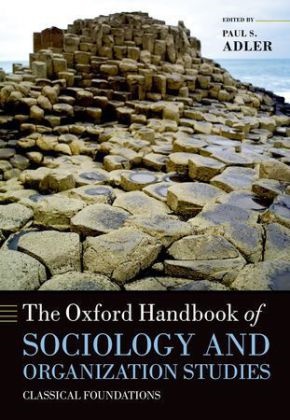Read more
Zusatztext provides excellent supplemental reading to original works of Karl Marx, Max Weber, Thorstein Veblen, and other notables within this field of research. Summing up: Recommended. Informationen zum Autor Professor Adler began his education in Australia and moved to France in 1974. He received his doctorate in economics and management there while working as a Research Economist for the French government. He came to the USA in 1981, and before arriving at USC in 1991, he was affiliated with the Brookings Institution, Columbia University, the Harvard Business School, and Stanford's School of Engineering. His research and teaching focus on organization theory and design, strategic management and human resource management in R&D, engineering, software, healthcare, and manufacturing operations. He has served as chair of the Technology and Innovation Management Division and the Critical Management Studies Interest Group of the Academy of Management, and he has published widely in academic and managerial journals both in the U.S. and overseas. His most recent book was The Firm as a Collaborative Community: Reconstructing Trust in the Knowledge Economy (OUP, 2006). Klappentext This Handbook re-asserts the importance of classical sociology as a rich source of insight for contemporary work in Organization Studies! and demonstrates the way in which these pioneers were deeply engaged with practical! social! and political issues of their time! compared with the increasingly academic focus of research in more recent decades. Zusammenfassung Organizations are a defining feature of the modern world, and the study of organizations (organization studies) has become well established in both sociology departments and professional schools, most notably business and management schools. Organization studies has long drawn inspiration from foundational work in sociology. In particular, "classical" works in sociology have long energized organizational research, primarily by suggesting ways of making sense of the ever-accelerating pace of social change. In recent decades, however, the field has lost interest in these sociology classics. This trend reflects and reinforces an increasingly academic focus of contempory organization studies. Not only does this trend weaken organization studies' engagement with the big social issues of our time, but it isolates the field from the broader field of the social sciences. The aim of this Handbook is to re-assert the importance of classical sociology to the future of organization studies. Alongside several thematic chapters, the volume includes chapters on each of nearly two dozen major European and American theorists, each of these chapter addressing: (a) the ideas and their context, (b) the impact of these ideas on the field of organization studies, and (c) the potential future research these ideas might inspire. The goal is not reverential exegesis, but rather to examine how the classics can energize organizational research.This wide-ranging Handbook, with contributions from leading American and European scholars, will be a vital, informative, and stimulating resource for anybody undertaking research in, teaching, or interested in learning more about organization studies today. Inhaltsverzeichnis Part I: The Role of the Classics 1: Paul Adler: Introduction: A Social Science which Forgets its Founders is Lost 2: Patricia H. Thornton: The Value of the Classics Part II: European Perspectives 3: Richard Swedburg: Tocqueville as a Pioneer in Organization Theory 4: Paul Adler: Marx and Organization Studies Today 5: Richard Marens: It's Not Just for Communists any More: Marxian Political Economy and Organizational Theory 6: Stewart Clegg and Michael Lounsbury: Weber:Sintering the Iron Cage: Translation, Domination, and Rationality 7: Paul du Gay: Max Weber and the Ethics of Office 8: Pamela S. Tolbert and Shon R. H...

